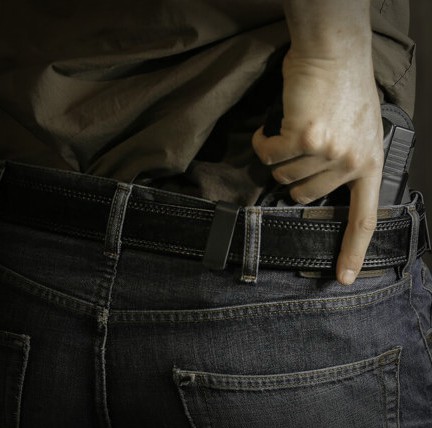 On April 26, 2005 Jeb Bush, Florida’s acting Governor at the time signed Senate Bill 436 into state law. The “Protection of Persons/Use of Force” bill more popularly known as the“stand your ground” law have become the subject of increasing political and public debate [1].
On April 26, 2005 Jeb Bush, Florida’s acting Governor at the time signed Senate Bill 436 into state law. The “Protection of Persons/Use of Force” bill more popularly known as the“stand your ground” law have become the subject of increasing political and public debate [1].
In 2012, young Trayvon Martin was tragically killed in an altercation with George Zimmerman. [2]. This incident had a large portion of the nation calling for the repeal of SB 436, with the 112th Congress even going as far as to pass a resolution affirming the public opinion of repealing the law. The latest in the series of headline “stand your ground,” law cases is the July 19th shooting of Markeis McGlockton outside of a local convenience store [3]. Since 2005 these laws have become pervasive with 27 states adopting identical laws and another seven adopting it into legal practice. Under the Trump administration, we may see the ignition of another national powder keg.
The impetus concerning “stand your ground,” legislation is sound. These laws are derived from old English common law that dictates an individual may employ self-defense when there is no duty to retreat from any area they are lawfully allowed. The ‘castle doctrine’ is another precedent that dates back to antiquity from which stand your ground can attribute to its genus. This doctrine asserts the ‘no duty to retreat’ premise within the home or “castle” and other personal property that may be used as a domicile. The right of the individual to defend themselves is necessary in any functional society, but in the United States, liberal gun policy, racial tensions, and politically polarized interpretation of law have created a policy debacle.
Vendetta;
The vendetta here is self-defense vs. public safety. According to FBI data analyzed by the Urban Institute there are stark racial disparities between cases of white on white and white on black “stand your ground,” related shootings. White on black shootings is 281 percent more likely to be found ‘justified’ in court proceedings than white on white shootings [4]. This in conjunction with high profile shooting incidents of unarmed African Americans has made these laws a public safety concern. Historically, conservative citizens have championed such laws as promoting individual liberty, while more liberal citizens have denounced it as a danger to minority communities and a license to kill.
Within the text of the SB 436 bill is a clause that states an individual may utilize deadly force if they have a “reasonable belief” that the use of deadly force is necessary [5]. The subjectivity surrounding what constitutes reasonable belief has been the target of much scrutiny. In the Markeis McGlockton shooting, Michael Drekja, the gunman, was engaged in a verbal altercation over a handicapped parking space with McGlockton’s family. McGlockton then went outside and shoved Drekja to the ground. Drekja, in turn, pulled his gun from the seated position and fired into the deceased’s chest.
Furthermore, because McGlockton was the aggressor and initiated physical contact it is reasonable to surmise that Drekja felt threatened. However, once he pulled the gun, McGlockton ceased moving immediately. In the seconds between the gun being drawn and the shot being fired deadly force appeared to be optional given that McGlockton did not make any more steps toward Drekja.
Florida Attorney General Pam Bondi filed manslaughter charges against Drekja in spite of some law enforcement officials preemptively ruling the shooting justified.
Supporters of the self-defense argument believe “stand your ground”:
- Promotes individual liberty
- Disincentivizes crime
- Increases public safety
Supporters of the public safety hazard argument believe “stand your ground”:
- Places minorities at greater risk of being killed in innocuous disputes
- Increases shooting incidents
- Incentivizes gun purchases
Resolution:
Repealing “stand your ground” laws wholesale would not only be nigh impossible but would remove an important aspect of public safety, but the law as is has created a dangerous environment for the general public. Public opinion is so diametrical that policy measures assuaging the anxiety of both sides will be a tall order. In order to increase individual accountability and maintain public safety, these types of laws should be amended.
The “reasonable belief” is the clause within the “stand your ground’ doctrine should be removed from all legislative language regarding this matter. That clause is far too subjective for adequate justice to be served on behalf of both parties. Reasonable belief effectively legalizes bias on any basis from race, to religion, even basic attire; reasonable belief is determined at the moment of action by the individual preparing to use lethal force and in these scenarios, there are rarely witnesses.
Notwithstanding the previous statement, the McGlockton shooting was caught on camera and many still believe a single shove should be punishable by death when normally most people would simply get an assault charge. And it was revealed that Michael Drekja had displayed a pattern of threatening unarmed people whenever situations did not go his way. The potential for bias extends beyond race, the surrounding populace should not have to pay for the fear of an individual nor have fear placed upon them. The right to stand your ground is an important right that should not be infringed upon but personal liberty ends when it impedes another’s.
Take Action:
Want to end stand your ground laws? Sign up here-https://petitions.moveon.org/sign/end-stand-your-ground
Want to see the McGlockton incident video recording? View here- https://www.youtube.com/watch?v=iDtzofAUSJI
Curious about the history of stand your ground laws? Read this- http://time.com/4664242/caroline-light-stand-your-ground-qa/
Want to see empirical evidence of the effects of stand your ground laws in the United States? View here- https://www.rand.org/research/gun-policy/analysis/stand-your-ground/violent-crime.html
References
- “”Stand Your Ground and Self Defense in Florida by Charnele Tate: Legislative History” Ave Maria Law School, accessed August 20, 2018. https://avemarialaw.libguides.com/c.php?g=265754&p=1776591
- “Shooting of Trayvon Martin” Wikipedia, accessed August 20, 2018. https://en.wikipedia.org/wiki/Shooting_of_Trayvon_Martin
- “Prosecutor overrules sheriff” CNN, accessed August 20, 2018. https://www.cnn.com/2018/08/13/us/stand-your-ground-florida-shooting-charges/index.html
- “Race, Justifiable Homicide, and Stand Your Ground Laws”, Urban Institute, accessed August 20, 2018. https://www.urban.org/research/publication/race-justifiable-homicide-and-stand-your-ground-laws/view/full_report
- “Florida’s ‘Stand Your Ground’ Law: The Actual Effects and the Need for Clarification” University of Miami Law Review, accessed August 21, 2018. https://repository.law.miami.edu/cgi/viewcontent.cgi?article=1262&context=umlr



